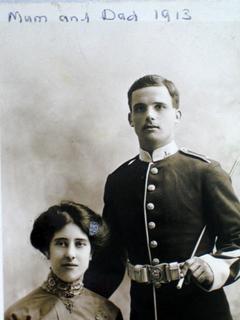The Lincolnshire's new recruit
 Walter made the decision to join the Royal Lincolnshires after returning to England from his cabin-boy duties aboard the Oropesa. He decided to visit his mother and step-father in Aldershot and was pleasantly surprised to see brother Bert visiting as well. Here's the story:
Walter made the decision to join the Royal Lincolnshires after returning to England from his cabin-boy duties aboard the Oropesa. He decided to visit his mother and step-father in Aldershot and was pleasantly surprised to see brother Bert visiting as well. Here's the story:We returned the same route, back to Liverpool, and the voyage lasted three months. I completed four trips, and then I decided I would like to come home and see my mother, who had married again in 1906 to a Staff sergeant in the Detention barracks in Aldershot. My dear old grandmother was still living there after all these years . . .
When we got there, it was lonely and dark, but luckily, there was another cab, waiting for late arrivals I suppose. He took me to No. 18 Warders Quarters and shone his lamp on the numbers, and when I knocked Bert was there, “what a surprise!” He had left his training ship and joined the Black Watch, the Royal Highlanders. He was stationed in the Curragh Camp in Ireland. Mother was there, it was now 2am in the morning and my stepfather had gone to Euston to meet me but he failed to do so. He arrived back home later. I slept with Bert that night and chatted for some time before falling to sleep.
In the morning, Mum asked Bert to take me to see Grandma, so he had to get himself all ready in his uniform and white spats. He was a bandsman and he looked quite, quite smart in his uniform. As we walked along to Aldershot we looked such an ill-assorted pair – he in his uniform and I just dressed in a reefer jacket and a pill box cap with the letters P.S.N.C. on it – Pacific Steam Navigation Company. Bert and I found Grandma quite well. It was twelve years since we saw her last as children before we were taken to the Foster Homes in Sheffield.
Walter always had great respect for big brother Bert. It's no wonder that Bert influenced his next big decision:
We returned home and settled down to discuss matters of interest. Bert told me not to go back to sea again, and he wanted me to join the army. (I was only five feet high with a head of black hair, and a lovely ruddy complexion.) I gave this suggestion serious thought, one has to make decision, and not to hesitate, as Fate always steps in whatever one decides to do. Bert took me to the Orderly Room of the Lincolnshire Regiment for the purpose of enlisting. The Regimental Sergeant-Major – a big burly man, asked me “how old I was.” I told him I was eighteen two weeks ago, on the 10th February. He advised me to come back tomorrow and bring my birth certificate with me. This I did, and Bert came with me to give me moral support. I filled in an attestation paper and signed it. I was taken before the Colonel G.A. Iratt, a hawk-faced gentleman, and a South African veteran. He asked me several questions, what previous occupation I performed and I produced my seaman’s discharge book. I was accepted and I was “sworn in” to serve seven years with the Colours and five years in the Army Reserve.
I was posted to “H” Company - Capt Rose, being my Company Commander, and Colour Sergeant Wade was in charge of discipline and pay accounts. I had a corporal to look after me regarding the duties and the daily routine. It was quite a new adventure, and it didn’t take me long to get accustomed to what was expected of me. I enlisted on the 3rd March 1908. I was issued with my army kit and the corporal shewn me how to arrange on the shelves and in the large kit base at the front of the bed. We had our meals in the barrack room, which was brought from the cookhouse by men detailed for that purpose. Drills and Physical training was my daily routine, and those heavy army boots began to make my feet tired after the day was at an end. Bert came to see how I was faring, as he encouraged me, and he promised to write to me when he returned to Ireland. He went back to the Curragh Camp, and he and I kept up communication.
This was the beginning of 22 years of service with the Royal Lincolnshires (1908-1915, 1921-1930) and the Machine Gun Corps (1915-1921) for Walter. I've always admired his decision-making philosopy: "one has to make a decision, and not to hesitate, as Fate always steps in. . . " He always seemed to have a good attitude about whatever befell him - not always happy and not always trusting, but knowing that it was up to him to react to the circumstances and move forward. And that attitude led him to some amazing adventures.

0 Comments:
Post a Comment
Subscribe to Post Comments [Atom]
<< Home